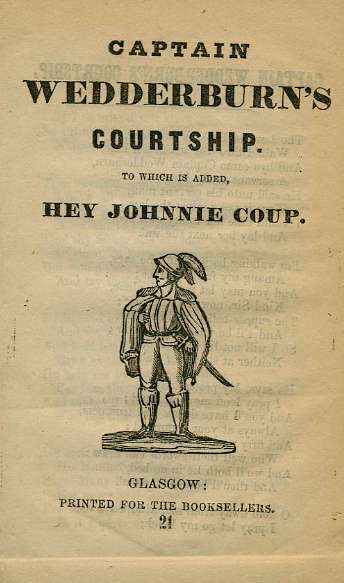English & Other Versions 46. Captain Wedderburn's Courtship
CONTENTS:
I'll No Ly Neist the Wa'- Herd MS; c.1776 Child A
Earl of Rosslyn's Daughter- Barr c.1778 Child B a.
Lord Roslin's Daughter- (Garland) 1775 Child B b.
Lord Roslin's Daughter- Buchan pre-1828 Child B c.
Captain Wedderburn's Courtship- 1803 Child B d.
Earl o Roslin's Dochter- Harris 1790s Child B e.
Captain Wedderburn- 1857 Child B f.
The Laird of Roslin's Daughter- 1847 Child C
Captain Wedderburn- Christie 1881
Gentleman's Daughter- Moran (Ireland) 1954
The Six Questions- Bowles (Fife) 1992

_____________
[This refers to Captain Wedderburn's Courtship, the text is similar to Child No 1.]
Blackwood's Magazine: Volume 57 - Page 173; 1845
In one of Goethe's little operas, which are far less studied than they deserve, although replete with grace, melody, and humour, we stumbled upon a ballad which we at once recognised as an old acquaintance. Some of our readers may happen to recollect the very witty and popular ditty called "Captain Wedderburn's Courtship," a peculiar favourite amongst the lower orders in Scotland, but not, so far as we knew, transplanted from its native soil. Our surprise, therefore, was great when we discovered Captain Wedderburn dressed out in the garb of a Junker of the middle ages, and "bonny Girzie Sinclair," the Laird of Roslin's daughter, masquerading as a German Fraillein. The coincidence, if it be not plagiary, is so curious, that we have translated the ballad with a much freer hand than usual, confessing at the same time that the advantage, in point of humour and gallantry, is clearly on the side of the old Mid-Lothian ditty.
The Cavalier's Choice.
It was a gallant cavalier
Of honour and renown,
And all to seek a ladye-love
He rode from town to town.
Till at a widow-woman's door
He drew the rein so free;
For at her side the knight espied
Her comely daughters three.
Well might he gaze upon them,
For they were fair and tall;
Ye never have seen fairer
In bower nor yet in hall.
Small marvel if the gallant's heart
Beat quicker in his breast:
'Twas hard to choose, and hard to lose—
How might he wale the best?
"Now, maidens, pretty maidens mine,
Who'll rede me riddles three?
And she who answers best of all
Shall be my own ladye!"
I ween they blush'd as maidens do
When such rare words they hear—
"Now speak thy riddles, if thou wilt,
Thou gay young Cavalier!"
"What's longer than the longest path?
First tell ye that to me;
And tell me what is deeper
Than is the deepest sea?
And tell me what is louder
Than is the londest horn?
And tell me what is sharper
Than is the sharpest thorn?
"And tell me what is greener
Than greenest grass on hill?
And tell me what is crueller
Than a wicked woman's will?"
The eldest and the second maid,
They sat and thought awhile;
But the youngest she look'd upward,
And spoke with merry smile.
"O, love is surely longer far
Than the longest paths that be;
And hell, they say, is deeper
Than is the deepest sea;
And thunder it is londer
Than is the londest horn;
And hunger it is sharper
Than is the sharpest thorn;
"I know a deadly poison
More green than grass on hill;
And the foul fiend he is crueller
Than any woman's will!"
Scarce had the maiden spoken
When the youth was by her side,
And, all for what she answer'd him,
Has claim'd her as his bride.
The eldest and the second maid,
They ponder'd and were dumb;
And there, perchance, are waiting yet
Till another wooer come.
Then, maidens, take this warning word,
Be neither slow nor shy,
And always, when a lover speaks,
Look kindly and reply.